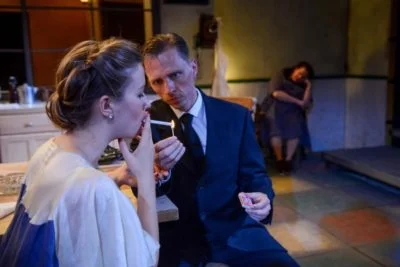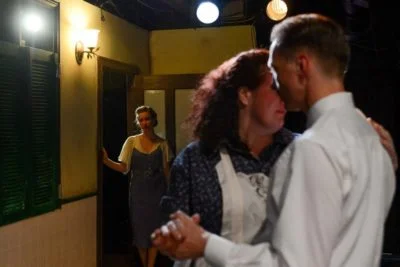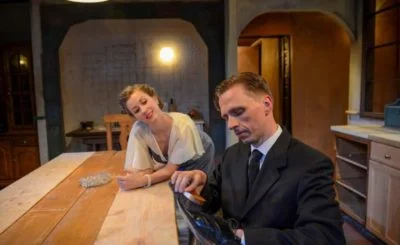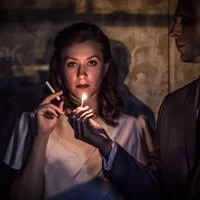After Miss Julie
Adapted from August Strindberg
Directed by Elly Green
Produced by Strawdog Theatre Company, Chicago
The Battle of the Brains Comes to Britain
Listen to my interview with Elly Green
Producing Patrick Marber’s After Miss Julie is to adapt an adaptation. Marber took August Strindberg’s landmark 1888 drama about a then-contemporary Swedish count’s daughter and her servants, and repurposed it for his 1995 screenplay to take place in England on the night of Labour’s victory over the Conservatives in the 1945 election. It was the kind of update any visionary director might do, finding the continuing relevance in Strindberg’s drama by moving it from the time when feminism was nascent and the aristocracy still held sway in backward, economically sluggish Sweden, to a time in Marber’s own country when the first generation of women who had always known suffrage came of age, and Churchill’s downfall signaled the imminent demise of Victorianism (though he’d be back). Strawdog Theatre’s mounting of Marber’s script under the direction of Elly Green adds a further layer of interpretation, at the beginning of a season dedicated to examining tipping points. But Strindberg’s distinctive psychosexual drama still shines through, making for a riveting production.

Though Miss Julie is Strindberg’s best known play, he wrote it at an odd moment in his artistic development. Strindberg was always interested in representing the subjectivity of experience—unusually for the time, he wrote in the stage directions that the set should be angled so the audience is looking into a corner, instead of seeing into the kitchen from the side, like a diorama. Not all parts of the room are visible, and at times, only parts of the actors’ bodies can be seen. But he also was going through a phase of interest in naturalism, the representation of people in an objective, scientifically accurate manner, although the scientific ideas of the 1880s seem fantastic to us. And, the former socialist and feminist was going through a personal and mental health crises during which he developed a relationship with Friedrich Nietzsche, and became a socially Darwinist and misogynistic (more so when he wrote the play’s infamous preface, long after completing the script). Miss Julie is clearly the result of all that, and while Marber’s update disguises some of these elements, Green’s production restores them. Strawdog is not a proscenium theatre, but Mike Mroch’s set design leads us directly through the kitchen to take our seats. True to naturalism, we can smell the kidney frying on the stove. But true to Strindberg’s interest in subjectivity, there are times when the pillars block one side of the audience’s view of an actor, forcing us to focus on the other’s responses.

The story is much the same: Miss Julie (Maggie Scrantom), having gotten drunk from joining the working peoples’ celebration, upset over breaking up with her fiancé, and desperate to get laid, expresses interest in her servant, John (John Henry Roberts). John is a social climber, having taught himself a little French, and dreaming of leaving the estate his family has worked for centuries, but still has the instinctive subservience of a born slave. He has settled for a relationship with the cook, Christine (Anita Deely), despite plainly not being attracted to her, and she, a combination of worldly cynicism and religious self-righteousness, recognizes this, and is determined to cling to him anyway. Julie’s desire to possess John for the night might be something Christine could overlook if nothing comes of it and they don’t get caught, but those are big ifs, and these people are all less rational and have less control over themselves than they like to think.
There are a number of ways these characters have been played over the years, but Green leads her cast in the direction that creates the most tension. While Jean/John can be played as a great manipulator, and Julie as his pawn, in the hands of Scrantom and Roberts, what she does to him is straightforward sexual harassment. Roberts’s look of humiliation and awkwardness starts off anguished and becomes more so throughout the night, made all the worse because John, not a particularly nice person himself, actually is attracted to her, but knows what she truly enjoys is domination. Scrantom’s Julie, however, is not initially aware of her own motivations (that discovery comes later). She attempts to reason calmly at first with John to convince him they will have a good time, and is nervous with the awareness that, while she has the power to hurt him, she does not have the power to cover-up her conduct or get away with it. Julie is sexually aggressive and lacks respect for her partners’ boundaries (which is why her fiancé rejected her), but she is not heartless or stupid, and wants to be on the right side of societal change. It occurs to her that, even if she could keep a one-night-stand a secret, she might be better off in a long-term relationship with an aspiring businessman, which gives Christine plenty of cause for objection. The thought occurs to John too, but his conservative upbringing as a servant has deep roots in his mind, and drives him to self-sabotage.

Marber’s biggest change, besides the setting, is expanding John’s backstory to make him a combat veteran. Besides providing Roberts with a more mature character to work with, this also changes Julie’s interaction with him in the final scene, which in the original, involved a bizarre use of hypnosis (the most glaring example in Miss Julie of science aging badly). The scene is still strange in Green’s production, but gets a much better build-up, and the tension is so thick at that point, that any resolution is a relief. It’s hard to describe just based on the plot how quietly intense Miss Julie is; it’s an embodiment, written the year before Creditors (done expertly a few years ago at Remy Bumppo), of what Strindberg called the battle of the brains— when one personality must devour another, and then find itself without a source of further nourishment. Green has tapped into it fully, and all three actors are wonderful. While less otherworldly than something straight from Strindberg’s mind, this adaptation would do him proud.
Highly Recommended
Jacob Davis
This show has been Jeff recommended.
Playing at Strawdog Theatre Company, 3829 N Broadway, Chicago. Tickets are $28 with discounts for students, seniors, groups, and rush; to order, call 866-811-4111. Performances are Thursdays-Saturdays at 8:00 pm and Sundays at 4:00 pm through October 3. Running time is ninety minutes.

